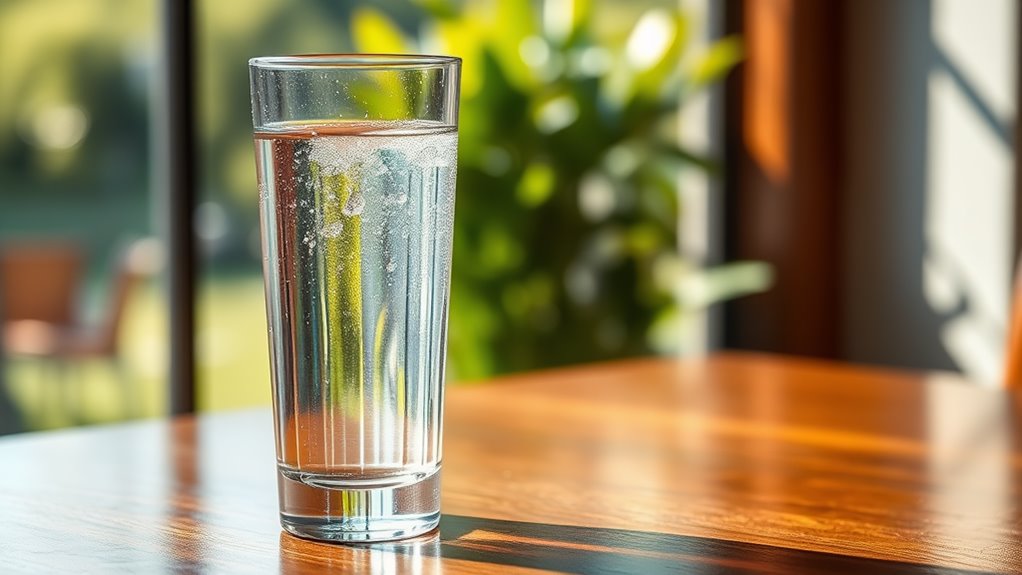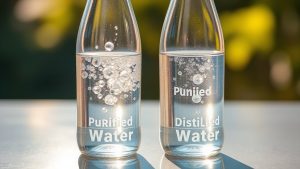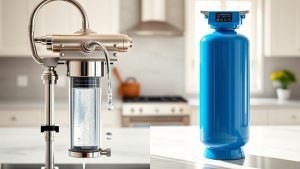What Is Purified Water and Is It Safe for You to Drink?
The truth about purified water’s safety and its impact on your health may surprise you—find out what you need to know.

Purified water is water that's been processed to remove impurities and contaminants, making it a safer choice compared to regular tap water. It undergoes various purification methods such as reverse osmosis and distillation. While it notably reduces exposure to harmful substances, relying solely on purified water for hydration can lead to a lack of essential minerals. Understanding the balance of hydration sources is vital for your health. Discover more about the implications and comparisons of different water types.
While you may think all water is safe, the reality is that not all sources meet the necessary safety standards. Purified water is processed specifically to remove impurities like chemicals and contaminants, making it a safer option compared to tap water in many areas. This water undergoes rigorous purification processes designed to meet safety standards and eliminate harmful substances. You can find purified water as bottled water or through various in-home purification systems, which are becoming increasingly popular.
The purification methods used for water include reverse osmosis, UV filtration, and distillation. Each of these techniques has its own advantages and effectiveness in removing different types of impurities. For instance, reverse osmosis is particularly good at eliminating many dissolved solids, while UV filtration effectively kills or inactivates microorganisms such as bacteria and viruses. Distillation involves boiling water to separate it from contaminants, guaranteeing high purity levels. Distilled water is a type of purified water that is obtained through the distillation process.
However, it's significant to mention that purified water lacks essential minerals like calcium and magnesium, which can lead to electrolyte imbalances if it's the sole source of hydration.
One of the major benefits of purified water is its ability to reduce exposure to contaminants commonly found in tap water, including bacteria, heavy metals, and various chemicals. This is particularly beneficial for individuals with weakened immune systems, such as pregnant women or young children, who need a clean and safe source of hydration. Additionally, purified water offers a clearer taste, as the removal of impurities often improves both the flavor and smell of the water. It's an excellent choice in areas where the local water supply is unreliable or contaminated, providing peace of mind regarding the quality of your drinking water.
Safety regulations play a significant role in guaranteeing that bottled water meets established safety standards, as regulated by the U.S. Food and Drug Administration (FDA). On the other hand, public drinking water is generally treated to be safe for consumption, but its quality can vary based on local regulations and water sources. If you opt for in-home purification systems, regular maintenance is vital to guarantee effective removal of contaminants. Keep in mind that water quality can vary greatly depending on the source and purification methods used.
When comparing purified water to other types, you'll find that it undergoes various purification methods, unlike distilled water, which relies solely on distillation. Purified water typically has a higher purity level than tap water due to additional purification steps. However, mineral water retains beneficial minerals, making it a different option altogether. Filtered water may not undergo the same rigorous purification process as purified water, and while distilled water shares some similarities, it also lacks essential minerals.
It is crucial to reflect on health implications when drinking purified water. Exclusively consuming purified water for extended periods might lead to health issues due to its lack of minerals. Balancing your hydration sources is key to maintaining ideal health.
Conclusion
In principle, purified water serves as a clear stream cutting through the murky depths of contaminants. It symbolizes safety and health, ensuring you hydrate with confidence. By removing impurities, it transforms into a revitalizing oasis, free from harmful substances that could jeopardize your well-being. So, when you choose purified water, you're not just quenching your thirst; you're embracing a healthier lifestyle. Its clarity reflects your commitment to making informed choices for a safer, more vibrant life.








